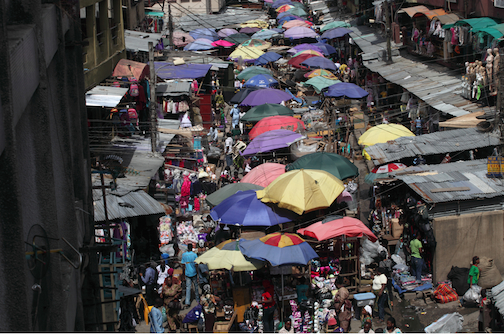

Market in central business district of Lagos, Nigeria. Photo courtesy of UNFPA/Akintunde Akinleye
Everyone is talking about the big day today, October 31, when the world's population is expected to surpass 7 billion. What's the big deal? Why the panic? Isn't a baby being born a good thing?
While it's exciting to have such a robust world population, it also presents huge challenges.
Let's look at the fact that in the US alone, we are currently in a struggle between the 99 percent and the 1 percent, aka Occupy Wall Street. So imagine what this inequality looks like in developing countries where the majority of the population doesn't have access to basic needs like clean water and health services.
Then let's also put this on the table. According to recent research by the World Health Organization, 215 million women around the world want, but do not have, access to quality reproductive health education and contraceptives.
The United Nations is working hard to provide women with access to reproductive health education and services, including contraceptives. But there are those that argue the UN efforts are a form of government coercion. I would argue that this is not the point at all.
Providing a woman with access to reproductive health education and health services is actually the opposite of coercion. It's empowerment.
There are many countries where children are sold or arranged into marriages at a very young age. They begin having children after their first menstruation. Do you think these girls really want to have their first child at age 12 or 13?
It has been proven over and over that once these girls have children at a young age, they lose their chance of getting educated, they continue to have more children, and they get fed right into the cycle of poverty, along with their entire family.
Conversely, it has been shown that when a young woman is educated about reproductive health and has access to contraceptives, she waits longer to have children, and has fewer children. She in turn creates a smaller, healthier family. This scenario in village after village, city after city, would ultimately create more sustainable communities around the world.
"There is a tremendous economic boon to the families and communities for having access to contraception," said Maureen Greenwood-Basken, Policy Initiatives Director, United Nations Foundation Women and Population, in an interview with me.
Babatunde Osotimehin, executive director of the United Nations Population Fund (UNFPA), agrees. At a recent press conference in London, he pointed out: "Governments that are serious about eradicating poverty should also be serious about providing the services, supplies and information that women need to exercise their reproductive rights."
As we struggle to address global issues of poverty and inequality, providing services and education to women and girls is the most direct solution. When a woman is healthy and educated, she can contribute fully to society. This in turn will trigger progress in her family, her community and nation. Aside from this, as human beings, it's just the right thing to do.
Earlier this month US House of Representatives voted to cut U.S. funding to UNFPA. To help restore funding, write your representative here and let them know that you care about women and children in developing countries.
